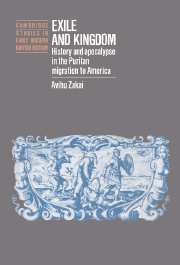Book contents
- Frontmatter
- Contents
- Acknowledgments
- Introduction
- 1 The creation of sacred time
- 2 The creation of sacred space I
- 3 The creation of sacred space II
- 4 The creation of sacred space III
- 5 The creation of sacred errand
- 6 The creation of a sacred Christian society
- 7 The creation of a holy Christian commonwealth
- Index
- Cambridge Studies in Early Modern British History
4 - The creation of sacred space III
Time, history, and eschatology in the Puritan migration into the wilderness
Published online by Cambridge University Press: 18 September 2009
- Frontmatter
- Contents
- Acknowledgments
- Introduction
- 1 The creation of sacred time
- 2 The creation of sacred space I
- 3 The creation of sacred space II
- 4 The creation of sacred space III
- 5 The creation of sacred errand
- 6 The creation of a sacred Christian society
- 7 The creation of a holy Christian commonwealth
- Index
- Cambridge Studies in Early Modern British History
Summary
ERRAND INTO THE WILDERNESS
Ever since Perry Miller wrote his brilliant and most influential essay, “Errand into the Wilderness” (1952), historians of early Puritan New England have debated continuously and persistently the question of the ultimate goal and mission of the Puritan migration to America. Indeed, in the historiography of Puritan New England, no other issue seems to generate more heat and controversy than that of the Puritan “Errand into the Wilderness.” The reasons for this debate are not hard to find. For what Miller did in his wonderful essay was in fact to call attention to the ideological origins, or goals, of the Puritan migration, without which it would be difficult, indeed impossible, to interpret the Puritan experience in early New England as a whole. So, according to Miller, “the large unspoken assumption in the errand” of the Puritan migration to New England, was that if the Puritan emigrants could realize the true religious reformation in America, Jehova “would bring back these temporary colonials to govern England.” Consequently, whereas the first phase of the Puritan Errand entailed the fulfillment of the goals of reformation in America, the second involved influencing the Puritan reformation back in England. According to Miller, the Puritan migration to New England
was an organized task force of Christians, executing a flank attack on the corruption of Christiandom. These Puritans did not flee to America; they went in order to work out that complete reformation which was not yet accomplished in England and Europe, but which would quickly be accomplished if only the saints back there had a working model to guide them.
- Type
- Chapter
- Information
- Exile and KingdomHistory and Apocalypse in the Puritan Migration to America, pp. 120 - 155Publisher: Cambridge University PressPrint publication year: 1991

